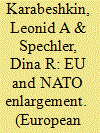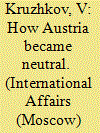|
|
|
Sort Order |
|
|
|
Items / Page
|
|
|
|
|
|
|
| Srl | Item |
| 1 |
ID:
080524


|
|
|
|
|
| Publication |
2007.
|
| Summary/Abstract |
For Russian policymakers no events in the post-Cold War period have had more momentous consequences or received greater public commentary, both before and after they occurred, than the almost simultaneous enlargement of NATO and the EU that took place in 2004. The most sensitive aspect of this 'dual enlargement' for the Russian Federation was the extension of these two organisations into the Baltic States, which had been part of the Soviet Union itself. Despite some uneasiness, Moscow anticipated that the extension of the EU into the former Soviet sphere, even into the former Soviet Union itself, would constitute a generally positive development, while NATO penetration of that sphere would be extremely harmful. Accordingly, Russia voiced little opposition to the EU's plans and made only limited efforts to insure that its major interests would be protected, while it actively sought to forestall the NATO project, especially with regard to the Baltics. As it turned out, however, most of Russia's expectations regarding the impact of these processes were mistaken, and Russia's interests were poorly served by its prior and subsequent responses
|
|
|
|
|
|
|
|
|
|
|
|
|
|
|
|
| 2 |
ID:
141286


|
|
|
|
|
| Summary/Abstract |
Russian President Vladimir Putin claims that his country's annexation of Crimea in March 2014 was partly in response to NATO enlargement. NATO leaders counter that eastern enlargement is not a cause of the Ukraine crisis, and they argue that enlargement does not threaten Russia, but rather it creates stability for all of Europe. This article examines the history of NATO–Russian tensions over enlargement, considers how NATO's enlargement policy factored into the Ukraine crisis, and reviews options for the future of enlargement. Drawing on diplomatic history and geopolitical theory, the article explains Russia's persistent hostility towards NATO's policy of eastward expansion and highlights NATO's failure to convert Russia to its liberal world-view. The alliance's norm-driven enlargement policy has hindered the creation of an enduring NATO–Russia cooperative relationship and helped fuel the outbreak of conflict in Georgia and Ukraine. In light of this, NATO should alter its current enlargement policy by infusing it with geopolitical rationales. This means downgrading the transformative and democratization elements of enlargement and, instead, focusing on how candidate countries add to NATO capabilities and impact overall alliance security. A geopolitically-driven enlargement policy would prioritize countries in the Balkan and Scandinavian regions for membership and openly exclude Georgia and Ukraine from membership. Ultimately, this policy would have the effect of strengthening NATO while giving it more flexibility in dealing with Russia.
|
|
|
|
|
|
|
|
|
|
|
|
|
|
|
|
| 3 |
ID:
065640


|
|
|
|
|
| Publication |
1998.
|
| Description |
p.145-151
|
|
|
|
|
|
|
|
|
|
|
|
|
|
|
|
| 4 |
ID:
090027


|
|
|
|
|
| Publication |
2008.
|
| Summary/Abstract |
In the process of the postwar settlement in Austria in the 1940s-1950s, the Western powers that occupied it (together with the Soviet Union) sought to draw the country into their military-political orbit. Needless to say, the USSR, which made a decisive contribution to freeing Austria from German Nazism and re-establishing its statehood, did not want the country to side with unfriendly forces again. As for the Austrians, spooked by the prospect of the "Sovietization" of the Alpine republic, they regarded the Western Occupying Powers as a guarantee of their sovereignty. However, when they realized that Austria was just "a bargaining chip" in a big geopolitical game, Austrian diplomacy became an independent player in the triangle of interests: the West - Austria - the USSR. As a result of intensive domestic political debate and hard-going negotiations with the parties concerned, the Austrians made a choice in favor of permanent neutrality. In the current debate on the issue of NATO enlargement, Austrian experience may prove to be highly relevant.
|
|
|
|
|
|
|
|
|
|
|
|
|
|
|
|
| 5 |
ID:
053959


|
|
|
|
|
| Publication |
Atlanta, Center for International Strategy, Technology and Policy, 1997.
|
| Description |
57p.
|
| Series |
Atlanta papers;2
|
|
|
|
|
|
|
|
|
|
|
|
Copies: C:1/I:0,R:0,Q:0
Circulation
| Accession# | Call# | Current Location | Status | Policy | Location |
| 039472 | 355.031/NAT 039472 | Main | On Shelf | General | |
|
|
|
|
| 6 |
ID:
053960


|
|
|
|
|
| Publication |
Frankfurt, PEace Research Institute, 1995.
|
| Description |
46p.
|
| Series |
PRIF reports;38
|
|
|
|
|
|
|
|
|
|
|
|
Copies: C:1/I:0,R:0,Q:0
Circulation
| Accession# | Call# | Current Location | Status | Policy | Location |
| 041459 | 355.031/MEY 041459 | Main | On Shelf | General | |
|
|
|
|
| 7 |
ID:
056021


|
|
|
| 8 |
ID:
066753


|
|
|
| 9 |
ID:
069869


|
|
|
|
|
| Publication |
2005.
|
| Summary/Abstract |
The second enlargement of the North Atlantic Treaty Organization (NATO) since the end of the cold war fueled an ongoing debate over whether the alliance contributes to democratization in Europe. In the 1990s, critics warned that the 1999 NATO enlargement would cultivate a new cold war and prove irrelevant to democratic consolidation in central Europe. Events have not borne out these forecasts, however. In Poland, not only did NATO build a civilian consensus in favor of democratic control over the armed forces corresponding to NATO norms, but it also delegitimized Polish arguments for defense self-sufficiency that had derived their credibility from Poland's experience of military vulnerability and foreign domination. Such democratizing and denationalizing trends have contributed to stability in postcommunist Europe. An assessment of the seven states that joined in 2004 similarly reveals some scope for NATO's influence in all cases. The alliance's access to domestic reform processes, however, will be uneven across cases in ways largely consistent with the predictions of the theoretical framework in this article.
|
|
|
|
|
|
|
|
|
|
|
|
|
|
|
|
| 10 |
ID:
084105


|
|
|
| 11 |
ID:
175624


|
|
|
|
|
| Summary/Abstract |
This article recounts Russia’s response to NATO’s eastern enlargement. It argues that NATO enlargement was seen as perfectly acceptable in Moscow, as long as it was inclusive of Russia, which would gain in status as America’s key partner and ally. Once it became apparent that Russia would not be invited to join, the narrative changed to active opposition, as Boris Yeltsin sought domestic legitimacy from being perceived as thedefender of the national interest against Western encroachment. The article highlights the fluid nature of so called national interests, which are defined and redefined in ways affording the greatest legitimation to the political elites.
|
|
|
|
|
|
|
|
|
|
|
|
|
|
|
|
| 12 |
ID:
022718


|
|
|
|
|
| Publication |
Oct 2002.
|
| Description |
713-729
|
|
|
|
|
|
|
|
|
|
|
|
|
|
|
|
| 13 |
ID:
023605


|
|
|
|
|
| Publication |
March 2003.
|
| Description |
106-112
|
|
|
|
|
|
|
|
|
|
|
|
|
|
|
|
|
|
|
|
|